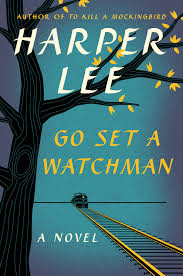 Atticus Finch’s change from “To Kill a Mockingbird’s” social justice/civil rights role model to “Go Set a Watchman’s” resident racist may be the most drastic character development since the Yippee-shouting young Anakin Skywalker became the throat-crushing Sith Lord Darth Vader.
Atticus Finch’s change from “To Kill a Mockingbird’s” social justice/civil rights role model to “Go Set a Watchman’s” resident racist may be the most drastic character development since the Yippee-shouting young Anakin Skywalker became the throat-crushing Sith Lord Darth Vader.
Readers who embraced Finch’s nobility – and who have even named their children after him – are understandably disturbed by this revelation. As Megan Garber writes in “The Atlantic,” “What are we—we readers and watchers and admirers of Atticus Finch as a father and a fighter, we who have embraced his heady symbolism, we who have named our children in his honor, we who have, finally, no say at all in his fictive fate—to make of that shift? What are we to do upon learning that the man who was so stubborn in his sense of justice has chosen, in the end, to live on the wrong side of history?”
Well, here’s my attempt to answer that question. First, I need to say I haven’t read “Go Set a Watchman,” but I sure have read a lot about the book, most notably about Atticus, who seems to have evolved from hero to villain.
Here’s the thing, though. The opposite is actually true. Since “Go Set a Watchman” was written first (though never published), Atticus actually evolved from villain to hero as a natural part of the writing process.
“Go Set a Watchman” was Harper Lee’s first attempt at writing a novel, and like a lot of first novels, the author was still learning her craft. If the story was good, it would have been published right away – or at least soon after “Mockingbird” became a hit to capitalize on its popularity. Instead, it was rejected, and lay lost and forgotten in a safe deposit box until recently.
“To Kill a Mockingbird,” however, developed differently. It may have had roots in “Go Set a Watchman,” but ultimately, the already-developed characters took on a new life and a much better direction. That’s simply how the process of writing goes. You start out with one idea, then find yourself going in a completely different direction because the characters and story have taken on a life of their own. Lee had no obligation to reflect the character traits she created for Atticus in “Watchman” because that version of him technically did not exist in “the real world.”
Instead of focusing on his darkness, she emphasized and developed the “better angels of his nature.” Again, it’s an author’s prerogative to do that. And obviously, it worked because “Mockingbird” became an iconic book and story with little indication that Atticus would turn into the man he is in “Watchman” (though The New York Times review references some hints in “Mockingbird” that Atticus isn’t the paragon of virtue he’s been made out to be).
At least with Anakin Skywalker, George Lucas had planted the seeds of his turn to the dark side in the original trilogy. Regardless of how you feel about the prequels, you can’t say Anakin’s change came out of the blue. That’s not so with Atticus Finch, whose Keyser Söze-like transformation has no basis in the fictional reality of “Mockingbird.”
Granted, this is all speculation on my part since I can’t read Harper Lee’s mind, but it certainly makes sense as to why things transpired as they did.
So how should people who read “Go Set a Watchman” approach it? Despite it’s lack of sci-fi elements, the best way to look at it may be as an alternate reality novel, as a Bizarro World interpretation of the Finch family’s life. It shouldn’t really be discussed as a sequel because it’s technically not. It’s an author’s first attempt at writing that may not ever have been supposed to see the light of day.
Let the world continue to embrace the Atticus Finch of “To Kill a Mockingbird” because that Atticus has influenced the world in a positive way. Maybe he was too noble and without flaws to be realistic, but he was a hero for his time who continues to resonate with people today.
As for Bizarro Atticus, maybe he should be looked at as an aberration. And while the book about him is undoubtedly making lots of money, I suspect that some readers will wish it had stayed in the safe deposit box.












